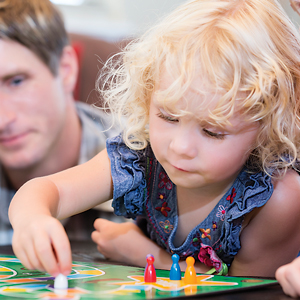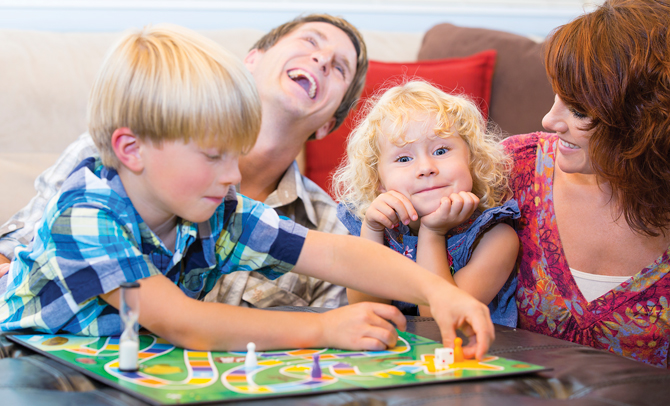Unplugging as a family with board games provides necessary life and learning skills and hours of family entertainment.
Unplugging with Board Games
In our house, playing board games is a big part of how we spend time together as a family. My husband and I and our two kids declare family game night at least twice a week. We may play a quick game of Uno or Zigity (another cool card game) to unwind one evening during the school week and save a longer game of Monopoly or Life for a Sunday. Currently, our game of choice is poker, but we also like Clue, Pictionary Jr., Scrabble, and a similar word game called Nab It.

The four of us have shared plenty of laughs and yes, even a few tears while playing games at the kitchen table. I enjoy playing not only because of the time spent together, but also because of everything our children learn through game play. Playing poker, for example, teaches the kids how to think, concentrate, and strategize, how to count, and how to win or lose as good sports. Breaking out Family Trivial Pursuit and partnering up enables the kids to learn how to work as a team.
In today’s world of computers, cell phones, electronic tablets, video games, and the need for instant gratification through tech, combined with busier-than-ever schedules that send family members off in different directions, it seems board-game play might have fallen by the wayside. But, as it turns out, holding regular family game nights is beneficial to children and families in many ways.
“On a very basic level, board games provide hours of pleasurable activities for family members to bond over and creates memories of fun times,” says Aradhana (Bela) Sood, MD, a professor of psychiatry and pediatrics with Virginia Commonwealth University Health Systems. “Children’s social skills improve simply because they are having to interact, negotiate, and get along with whoever they are playing with.”
Valarie Krol of Midlothian knows all too well how hectic schedules can get for herself, her husband, and her four children throughout the week, so she attempts to make every Saturday a family night, which often includes playing games. Her children enjoy Life, Monopoly, and Uno.
“It’s a fun way to spend time together,” Krol says. “I love game nights because we are all together doing something that everyone wants to do. There are so many of us and so many different personalities and interests. No matter the game, we all have fun and enjoy every minute of it.”
Krol has two girls, ages thirteen and ten, and two boys, ages three years and eighteen months, so the family takes turns playing a game that is age-appropriate for each of the kids.
“When the little ones are with us, we play games like Memory, Super Why, or sometimes we just put together those giant floor puzzles,” says Krol. “We do play Uno a lot. That is a game we take with us everywhere. When we travel for soccer [tournaments] and stay in hotels, it’s something we can spend time doing while relaxing after a long day. Candy Land is still a fun game at all ages. We also play Clue a lot. The girls like the mystery of it.”
Gaining Life Skills Through Board Games
Beyond family bonding, children gain skills through board-game play that help them with other aspects of their lives.

“On a more cognitive level, games can help with critical thinking, strategy, and visuospatial skills,” says. Dr. Sood. “When strategy rather than luck operates in the board game, or vice versa, children learn how that may apply to life. For younger kids, board games can be the place where number and word recognition can begin to make sense for the first time. Board games can also help children begin to appreciate boundaries, rules, and how to tame their need for immediate gratification.”
Shannon Saweikis, also of Midlothian, likes to play Battleship with her nine-year-old son or Chutes and Ladders with her four-year-old daughter. Saweikis and her daughter play games multiple times a week.
“I think children learn a lot of different skills when playing board games,” Saweikis says. “Counting is a big one, and reading as well. They learn that sometimes they win and sometimes they lose. And hopefully, they learn how to become gracious losers. I think it’s a great way to spend time with
all your children. Another aspect is that it is a good alternative to TV or video games.”
West End mother of two Alice Taylor agrees. Playing games “is a fun time to decompress and reconnect with no computers or television,” Taylor says. “We can also be a pretty competitive family, so it is a good time to teach a little sportsmanship.”
Some of her family’s favorite games are Sorry, Monopoly, Clue, and Qwirkle.
“We have played Sorry since the kids were much younger because it required little math or reading, but now they understand that there can be some strategy around it,” Taylor shares. She adds that Monopoly has been a fantastic tool for learning about money management. “We can come up with some pretty creative ideas for property exchanges and money loans. At the same time, we never know when the luck of the dice is going to go in our favor or send us to jail.”
Taylor’s witnessed how game play is helpful to her two children, now eleven and nine.
“I think playing games is beneficial if for nothing else but the quality time you get to spend with your kids,” Taylor says. “You get to see how they handle themselves when they are winning and losing. Teaching them to win and lose graciously is important, and I believe it translates into other areas of their lives. Sometimes kids don’t like to lose. Then again, sometimes neither do adults – so we explain the importance of not giving up or quitting when the game isn’t going your way. We also talk about the importance of thinking through your next move in the game. You have to also think about what are the possible moves of your opponents. These are all good life lessons for dealing with friends and school.”
Research shows that playing cards or a game of chess can also make for better students in school. According to one study, children gain executive function skills through game play that lead to successful learning in the classroom.
Playing board games, says Dr. Sood, aids children with the development of critical thinking skills, analytical skills, and other skills they will need to use while they are in school. Keeping score and counting spaces assists with math skills, while games like Scrabble, Bananagrams, or Word Yahtzee aid with spelling and reading. Children also learn better communication and social skills, as well as problem-solving skills through game play.
“They learn how to take turns, observe more, and listen,” Dr. Sood says. “They learn how to be better participants in the group process, and learn how things and events are ordered, how to follow rules, keep score, and where rules can be bent and which ones are a no-no.”
Dr. Sood suggests games such as Scrabble and Othello for older kids, Chutes and Ladders for the younger set, and Boggle, Hangman, and Connect Four for those in between as classic games to assist with the development of such skills.
“Of course, trivia games are great for whetting kids’ appetite about learning facts,” says Dr. Sood. “Strategy games are also good. You can rent games to try out and see if they are fun or borrow one from a friend.”
Community Programs for Game Night Fun
Area elementary schools and local libraries offer game nights periodically to provide opportunity for family and friends to gather for some fun while introducing new games. Public libraries in Chesterfield County hold chess tournaments and host Wii game nights while libraries in Henrico County hold game events for families and teens. At Twin Hickory Library in the far West End, family fun nights are held monthly with as many as eighty people turning out to partake in various programs and activities, including Bingo, Hangman, Scrabble tournaments and challenges based on the TV game show Minute to Win It.
“Perhaps the most important part of these programs is the opportunity for families to play together, especially those with working parents,” says Gay Lynn Van Vleck, children’s services supervisor for Twin Hickory Library. “We often are tickled by the fact that the parents have as much fun as their children.” Van Vleck says the library team tries to incorporate learning into all of the games. In Bingo, they’ll use words and phrases in the blocks and spell words as the category is called. The library associate says socialization is a big part of the success of family game night. “The children learn team skills of listening and how to integrate several ideas to make a plan work. A few families have also mentioned that they make new friends at these programs, so the events are especially valuable to folks who are new to the area,” she says.
While video games tend to have a bad rep, played in moderation, these games can be beneficial to children. Occasionally, my husband and I will dig out our old-school Atari and share games with our children from our own childhoods. Playing Pac-Man, Frogger, Kaboom, or Super Breakout allows us to bond with our children and allows them to experience our nostalgia. Wii Sports or Just Dance provides an opportunity to have fun while getting physical on days when exercising outside isn’t an option. Meanwhile, our daughter learns to spell and read through electronic Wheel of Fortune. Video games can also help with hand eye coordination and strategy.
No matter what games you decide to play as a family, it’s important to make it as much a regular part of your family life as possible. Start with something simple and non-competitive and it eventually may become a regular activity.
“Make game nights once a month a standard,” suggests Dr. Sood. “Give everyone a chance to excel and find what they may like and incorporate that game as a choice.”
Valarie Krol hopes family game night will continue to be a staple in her house.
“I think it’s important to spend time together to keep a strong bond among us and the kids, and the kids with each other,” says Krol. “I hope that no matter where their adult lives will take them, they will remember the fun times we had sitting around and playing games, and that even if it’s just occasionally throughout the year, we are still able to have these game nights.”




